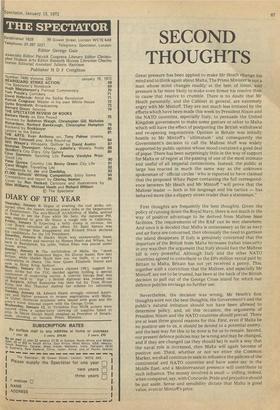SECOND THOUGHTS
Great pressure has been applied to make Mr Heath change his mind and to think again about Malta. The Prime Minister is not a man whose mind changes readily at the best of times, and pressure is far more likely to make even firmer his resolve than to cause that resolve to crumble. There is no doubt that Mr Heath personally, and the Cabinet in general, are extremely angry with Mr Mintoff. They are not much less irritated by the efforts which have been made this week by President Nixon and the NATO countries, especially Italy, to persuade the United Kingdom government to make some gesture or other to Malta which will have the effect of postponing the British withdrawal and re-opening negotiations. Opinion in Britain was initially hostile to Mr Mintoff s ' ultimatum' and consequently the Government's decision to call the Maltese bluff was widely supported by public opinion whose mood contained a good deal of pique. There has been surprisingly little in the way of support for Malta or of regret at the passing of one of the most intimate and useful of all Imperial connections. Instead, the public at large has reacted in much the same way as the unknown spokesman of official circles 'who is reported to have claimed that the proposed White Paper containing the full correspondence between Mr Heath and Mr Mintoff "will prove that the Maltese leader — both in his language and his tactics — has behaved more like a slippery street-trader than a statesman."
First thoughts are frequently the best thoughts. Given the policy of runnin& down the Royal Navy, there is not much in the way of positive advantage to be derived from Maltese base facilities, The requirements of the RAF can be met elsewhere. And once it is decided that Malta is unnecessary as far as navy and air force are concerned, then obviously the need to garrison the island disappears. If Italy is genuinely concerned that the departure of the British from Malta increases Italian insecurity in any way,then the argument that Italy should foot the Maltese bill is very powerful. Although Italy and the other NATO countries agreed to contribute to the E91/2 million rental paid by Britain to Malta, Britain has not yet received a penny. This, together with a conviction that the Maltese, and especially Mr Mintoff, are not to be trusted, has been at the back of the British decision to pull out of the George Cross island for which our defence policies envisage no further use.
Nevertheless, the decision was wrong, Mr Heath's first thoughts were not the best thoughts, the Government's and the public's natural irritation should not have been allowed to determine policy, and, on this occasion, the arguments of President Nixon and the NATO countries should prevail. There are at least three g000d reasons for this. First, even if Malta be no positive use to us, it should be denied to a potential enemy, and the best way for this to be done is for us to remain. Second, our present defence policies may be wrong and may be changed, and if they are changed (as they should be) in such a way that the naval role is increased, then Malta will again become of positive use. Third, whether or not we enter the Common Market, we shall continue to seek to influence the policies of the continental and NATO countries and have some say in the Middle East, and a Mediterranean presence will contribute to such influence. The money involved is small — trifling, indeed, 'when compared, say, with Concorde. Pride and prejudice should be put aside. Sense and sensibility dictate that Malta is good value, even at Mintoff's price.










































 Previous page
Previous page